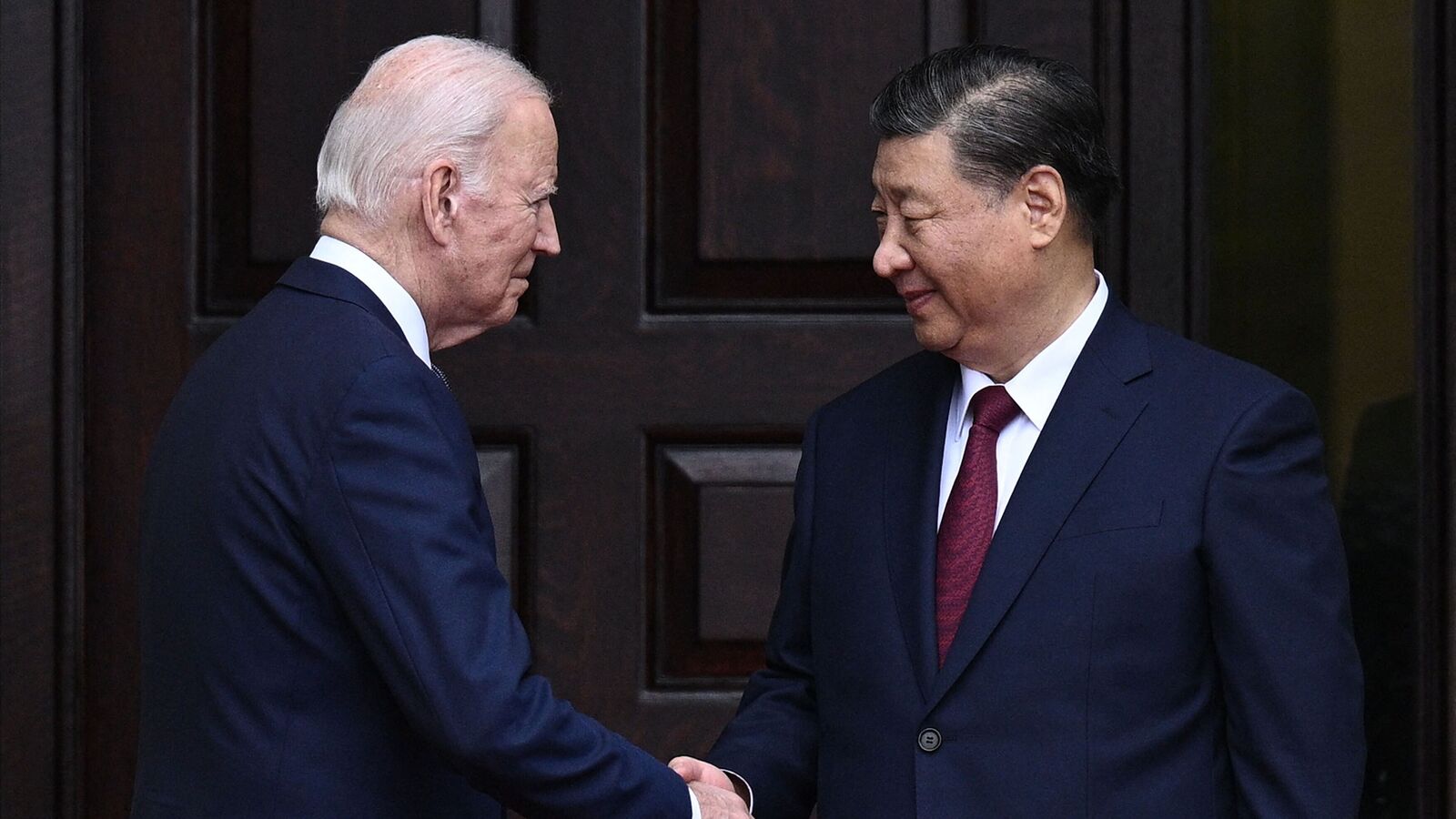The 27-year-old doctoral student had been trying for more than eight years to get his father, Kai Li, out of China, where he was imprisoned on espionage charges the U.S. government viewed as baseless.
Around the same time, 6,500 miles away, Chinese officials showed up at 73-year-old Ayshem Mamut’s home in Xinjiang, to transport her to Beijing.
For 20 years she hadn’t seen her son, Nury Turkel, a prominent voice in Washington against China’s treatment of its mostly Muslim ethnic Uyghur citizens in the region of Xinjiang. Stripped of her Chinese passport, she didn’t know if she would ever meet her grandchildren.
The Biden administration had spent more than a year trying to forge a deal with Beijing to let several imprisoned Americans leave China. Now it looked like a swap was coming together—and that it would include Chinese Uyghurs like Mamut as well.
The deal would only work, China had warned, if the U.S. kept it quiet. The plane hadn’t taken off yet, a State Department contact told Harrison Li, and the plan could still fall apart.
Few foreign-policy challenges have been as troubling to the U.S. as a surge in arrests of Americans by autocratic regimes. On his desk, Biden’s national security adviser, Jake Sullivan, has kept mementos from families of Americans detained overseas; Secretary of State Antony Blinken has traveled around the world with a list of the prisoners in his breast pocket.
The administration had engineered a series of trades that brought home Americans from countries with which the U.S. has almost no relationship—Russia, but also Venezuela and Iran—brushing aside criticism that the arrangements reward state-sponsored hostage-taking. But Beijing hadn’t seemed receptive to prisoner swaps. And China now held the most Americans whom Washington and rights groups viewed as targeted because of their citizenship.
The Biden administration focused on three men in particular.
Kai Li, Harrison’s father, who had sold space equipment for companies such as Boeing in China, was detained in September 2016. A decade earlier, David Lin, a pastor, had been swept up in a campaign targeting foreign missionaries and given a life sentence on a contract-fraud charge. The third American was Mark Swidan, a Texan serving an effective life sentence after being accused of running a narcotics ring.
This article is based on interviews with more than a dozen people involved in the complex efforts to craft a deal, including detainees, their families and U.S. officials.
Statistics and diplomacy
Harrison Li was a junior at Harvard University when his father, who had flown to Shanghai to mark the anniversary of his mother’s passing, was arrested on arrival. Kai Li was eventually sentenced to 10 years behind bars.
Even in the world of Ivy League overachievers, Harrison stood out. By 18, he was more than halfway through Harvard, teaching older students about stochastic processes. At Stanford, Harrison focused on a niche of statistics called causal inference and looked for clues to get his father home.
While Biden met with the families of Brittney Griner—the basketball star arrested in Russia—and those taken hostage in the Oct. 7, 2023, attack on Israel, the families of the prisoners in China couldn’t get that kind of attention.
No one could be sure what could get the Americans out of China—where, according to human-rights group Dui Hua Foundation, more than 200 Americans are in prison or unjustly detained in other ways. Unlike China, both Russia and Hamas were upfront about what they wanted in exchange.
Kai, now 62, could call Harrison twice a month. “I’m fine, don’t worry,” his dad usually told him. Six-and-a-half minutes into each call, an automated voice said in Chinese, “You have one minute left.”
As his father lingered in prison, Harrison and his mother closed two gas stations Kai had opened as a side business and sold one of his most-prized possessions, a fishing boat.
But an initial burst of media attention in 2019 yielded little, and Harrison worried the limelight could worsen his father’s situation. “I study statistics. I prefer doing that,” he said.
Mark Swidan’s mother figured rabble rousing was her only leverage. A former debt collector who uses a walker, she had managed to generate attention to her son’s situation from Texas Republican Sen. Ted Cruz and the actor Mel Gibson, who recorded a video in support.
Even so, Swidan, now 49, had spent years in a detention facility meant for short stays, where he slept packed tightly with other men directly on the damp concrete floor, along with frogs drawn into the cell by lights that were never turned off.
Hostage diplomacy
Beijing showed it was open to trades when it worked with Canada and the U.S. to orchestrate a complicated exchange in 2021 involving Huawei executive Meng Wanzhou, who had been detained in Canada on U.S. charges, and two Canadians grabbed by China after Meng’s arrest.
But in 2022, the Biden administration angered Beijing by cautioning Americans planning to travel to China that they could be subject to detention or prevented from leaving. Last year, it raised the warning level, urging Americans to reconsider travel to China.
In early 2023, China’s Embassy in Washington signaled a new position in a meeting with congressional aides. One of the aides raised Swidan’s case and urged, “Release him.” A top embassy official responded, “No, a swap.”
During a visit to Beijing by Blinken later that year, U.S. officials raised the prisoners. The discussions grew heated, and the delegation departed without a resolution. “We left thinking we had baited the hook,” one U.S. official said.
In China, U.S. Ambassador Nicholas Burns took the unusual step of visiting Lin, Li and Swidan in prison personally.
Visiting Swidan, Burns brushed aside officials’ instructions not to touch the prisoner and shook his hand. At their third meeting, Burns made a promise: “The next time I see you, we are walking out of here.”
Burns also called Mamut, the mother of Uyghur activist Turkel, and the embassy sent diplomats to Xinjiang to check on her.
Turkel, who was born in a government re-education camp in Xinjiang during China’s Cultural Revolution, moved to the U.S. in 1995 and is now a U.S. citizen.
As the Chinese government’s repression of Uyghurs intensified, Turkel wrote a book that spotlighted his parents’ ordeal. His father seemed proud when Turkel showed him a galley copy on a video call. But before the book was published in 2022, his father died.
At a White House reception soon after, Turkel appealed to Biden. “My mom is alone,” he said.
In the fall of 2023, Biden brought up the prisoners when he met with Chinese leader Xi Jinping in California, and asked Xi to allow Mamut to travel abroad. Around that time, Swidan was moved to a prison where, after sleeping on a concrete floor for 11 years, he got a cot. And in January, he was permitted to make his first phone call to his mother in more than five years.
A first step
In July, Blinken met with his Chinese counterpart, Wang Yi, in Laos and agreed on an opening move: Lin, the pastor who had been detained since 2006, would be released. In return, the U.S. would send home a Chinese music student, Xiaolei Wu, who had been convicted in Boston of threatening a Chinese activist there.
In August, the U.S. and Russia engineered the largest and most complex East-West prisoner swap since the Cold War. Moscow freed Wall Street Journal reporter Evan Gershkovich and more than a dozen others, including Russian dissidents, in exchange for Russians held in the U.S. and Europe.
In his years behind bars, Kai Li suffered a stroke and lost a tooth to disease. During the pandemic, he spent most of three years locked up 24 hours a day in his cell in Shanghai’s Qingpu Prison. He was housed in a wing for foreigners called Brigade No. 8, where men live in cells of up to 12. Kai counted 15 other Americans in the prison.
Six years into Kai’s imprisonment, his father died just across town.
Harrison Li finally secured a White House meeting with Sullivan days after Lin’s release in September; the national security adviser told Harrison and his mother that it was only a “first step.”
The next morning, Harrison was on Capitol Hill flanked by relatives of other American prisoners in China, his voice tinged with anger as he ticked off the dealmaking with other nations and said, “What about my dad? When will it be his time?”
Harrison’s mother sat two rows behind him, sobbing.
Sealing the deal
Biden had one last chance to discuss American prisoners with Xi: a summit in South America.
By then, the contours of a broader deal had fallen into place: Washington would ease the travel warning if China released the two other Americans on the U.S. priority list. Beijing also wanted back a Chinese intelligence officer, Yanjun Xu, who had been arrested in 2018 and convicted of espionage mostly involving aircraft technology, and others.
Roughly 10 days after Biden’s meeting with Xi, Chinese authorities released Swidan, Li and John Leung, a 78-year-old American convicted last year of espionage. They brought the prisoners to a private room at Beijing’s airport, where Burns gave them their passports and a hug. “You’re a free man now,” he told each of them.
At the airport, Mamut broke down in tears when she recognized the ambassador. On board the plane, she gripped the Chinese passport that had so long eluded her.
China said on Nov. 28 that four Chinese nationals had been returned to the country, including three who had been held in U.S. prisons and another person it describes as a fugitive.
Mamut’s ticket out of China marked a rare action by Beijing in response to U.S. criticism of its treatment of Uyghur minorities. In response to written questions, the Foreign Ministry defended its policies toward Xinjiang; it didn’t comment on why it was allowing Mamut to travel to the U.S.
By Thanksgiving evening, Mamut was sipping a cup of tea in Fairfax County, Va., as family members prepared a Uyghur-style dinner of lamb stew and steamed rice.
“I was in tears when my daughter ran to her grandma as if they knew each other,” Turkel said.
Reunited with Harrison, Kai Li said, “The first thing I want to do once I am all settled home is to go fishing.”
Write to Aruna Viswanatha at aruna.viswanatha@wsj.com, James T. Areddy at James.Areddy@wsj.com, Brian Spegele at Brian.Spegele@wsj.com and Gordon Lubold at gordon.lubold@wsj.com


